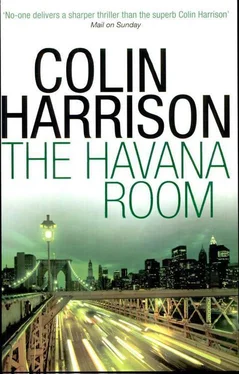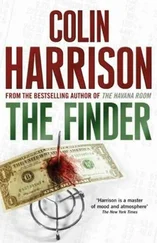Colin Harrison - The Havana Room
Здесь есть возможность читать онлайн «Colin Harrison - The Havana Room» весь текст электронной книги совершенно бесплатно (целиком полную версию без сокращений). В некоторых случаях можно слушать аудио, скачать через торрент в формате fb2 и присутствует краткое содержание. Жанр: Триллер, на английском языке. Описание произведения, (предисловие) а так же отзывы посетителей доступны на портале библиотеки ЛибКат.
- Название:The Havana Room
- Автор:
- Жанр:
- Год:неизвестен
- ISBN:нет данных
- Рейтинг книги:5 / 5. Голосов: 1
-
Избранное:Добавить в избранное
- Отзывы:
-
Ваша оценка:
- 100
- 1
- 2
- 3
- 4
- 5
The Havana Room: краткое содержание, описание и аннотация
Предлагаем к чтению аннотацию, описание, краткое содержание или предисловие (зависит от того, что написал сам автор книги «The Havana Room»). Если вы не нашли необходимую информацию о книге — напишите в комментариях, мы постараемся отыскать её.
The Havana Room — читать онлайн бесплатно полную книгу (весь текст) целиком
Ниже представлен текст книги, разбитый по страницам. Система сохранения места последней прочитанной страницы, позволяет с удобством читать онлайн бесплатно книгу «The Havana Room», без необходимости каждый раз заново искать на чём Вы остановились. Поставьте закладку, и сможете в любой момент перейти на страницу, на которой закончили чтение.
Интервал:
Закладка:
"You want me to drive?"
"No, it's all right."
And it was. By the time we'd crossed through the tunnel into Queens, he was sitting up straight and driving with crisp aggression.
"Those pills are pretty good," I noted.
"They are."
"You all right?" I asked.
"I'm fine, man, just tired."
He wasn't interested in talking, so I let it rest. The Long Island Expressway, always a dragway of insane drivers, becomes genuinely otherworldly on a snowy night, and to stay with the traffic we popped up to eighty, flying east past the billboards and shopping centers and exit signs, Jay seemingly noticing none of them. His eyes showed no sign, in fact, that he'd inked a real estate deal that evening or had to break his celebration with Allison, and I found myself remembering the oddly deadened sadness I'd seen in his face when he'd embraced her. In the pin-light darkness of the truck, his mouth was set, his gaze fixed on the road, and I thought I recognized in him a certain kind of man, a man who is damaged and yet unflinching. I've met a few. Because he has taken pain, such a man knows he can take more. In fact, he expects it; suffering, so far as he sees, is in the order of things, the logic of the universe. Usually such men are hard, even self-punishing workers, capable of long periods of isolation or aloneness, and suffer bouts of crippling melancholy. They refuse to take antidepressants, they refuse to talk too much; instead they wait and wait, with the patience of a cat, for the mood to turn. They drink coffee alone in the morning, they smoke cigarettes on the porch. Jay was like this. Such men believe in luck, they watch for signs, and they conduct private rituals that structure their despair and mark their waiting. They are relatively easy to recognize but hard to know, especially during the years when a man is most dangerous to himself, which begins at about age thirty-five, when he starts to tally his losses as well as his wins, and ends at about fifty, when, if he has not destroyed himself, he has learned that the force of time is better caught softly, and in small pieces. Between those points, however, he'd better watch out, better guard against the dangerous journey that beckons to him- the siege, the quest, the grandiosity, the dream. Yes, let me say it again. Quiet men with dreams can be dangerous.
The highway became more desolate as we passed the edge of Long Island's suburban sprawl and into the last thirty miles of farmland. Although far outside the eastern edge of Queens, we were still well within the city's dominion. The money on Long Island, tip to tip, is always, in some measure, New York City money, either coming from or going to. It has to be that way, because, except for potatoes and power boats and fresh fish, everything appearing on the island- every washing machine, every stick of lumber, every carton of orange juicecomes through the city on the way east. Eighty miles out, the island forks north and south, and with the South Fork already filled up with vacation houses and Hamptony attitudes, the North Fork was next; once off the highway we passed signs announcing new golf courses, condo construction, and wineries. I knew a bit about the land game. The idea, of course, is to get hold of an enormous piece of property, preferably with as little cash down as possible, subdivide it "tastefully," which is to say in such a way that it attracts wealthy buyers, and then sell out the whole thing. If the buyer plays cleverly, his leverage can be extraordinary.
"You see what's going on out here," Jay muttered. "It's a gold rush."
"Why did you decide to get rid of the land now?"
"The time was right," he said cryptically.
If able to be subdivided, a big piece of land like Jay's could be worth quite a bit more than he'd exchanged it for. Zoned at an acre per lot with greenbelt set-asides, a developer could still get perhaps seventy lots out of it, with twenty of them on the water. You'd have to drop in a million for water, roads, zoning applications, and sending the politicians to Bermuda, but even so, someone smart and energetic might be able to triple his money in five years. "You try to subdivide?" I asked.
He shook his head silently, made a series of turns, then stopped in the darkness at a chained dirt road that headed directly toward Long Island Sound. He got out and left the chain on the ground. I noticed a real estate broker's sign: HALLOCK PROPERTIES. Jay pulled it up and flung it into the grass.
"This the land?"
"Yeah."
"No longer yours, now."
"Not technically, counselor," he said, sitting down again.
"You gave Gerzon the key, I thought."
"I kept a copy." He nosed the truck ahead. "Always keep a copy, you know?"
The road passed through a stand of spruce trees, then opened up, wide to either side.
Jay hunched close to the windshield. "Where is he?"
I could see in the snowy dark that we were passing through an old farming operation. Massive outbuildings, a couple of abandoned tractors. Jay maneuvered around ruts and holes. "They haven't been keeping the road up."
"You know this land?"
"I grew up here, man."
"Right here, on this land?"
"Exactly," he said. "Hey, look for tracks."
But I saw nothing. The land lay to either side of the road in wide flats. We passed irrigation engine sheds, piles of piping, three ancient trees in a line, leafless yet magestic. The snow slapped against the car.
"The water is close?" I said.
"Quarter mile."
At the end of the road, a deep-bellied farm truck had pulled to the side, beyond which I could see the phosphorescent expanse of Long Island Sound. The truck was a big one, double sets of wheels on the rear, and about the size of a municipal garbage truck except that the container end was a steel trough filled high with potatoes. The truck also appeared to be missing its driver's door. At our approach a figure stepped out. He pulled his hat low and came straight up to Jay's side. It was Poppy, drinking coffee.
"Where's Herschel?" yelled Jay.
Poppy shook his head at the futility of the question. "Come on, it's bad."
I felt sick at the sound of this. We got out and followed Poppy directly to the edge of the sea cliff.
"Watch it there," said Jay, holding my shoulder. "It goes down two hundred feet."
The wind was coming hard off the ocean and pushed up the face of the cliff, so that where we stood snow flew into our faces even as we looked down. Poppy pointed his light at two wide tracks that dropped straight off the cliff. "Went right over."
Jay peered over as best he could. "Is he dead?"
Poppy shrugged. "If he was working in daylight, then he's been there eight hours anyway." He kicked at the sand. "Fucking snow made it hard to see the edge, I guess."
"When'd you find him?" Jay asked.
"Maybe ten o'clock tonight."
This made sense to me, for Poppy hadn't appeared in the Havana Room until after midnight.
"Was he alive?" I asked in terror.
"I don't know," snarled Poppy. "He could have been. But he wasn't moving."
"You didn't go down there?"
"No, no way. Not with my hands."
"You call the police?" I said, shivering now.
Poppy looked at Jay in fury, and despite Poppy's small size I took a step backward.
"Bill, hang on," said Jay. He nodded at Poppy. "All right, so you didn't go down."
"No way."
I peered over, couldn't see much.
"Don't get too close. The sand is shifty, there's no clean line."
Contrary to my expectation, the drop was not sheer but gradual. I edged forward. "There!"
Forty feet down the slope sat a bulldozer, treads right side down, held in place by a stand of leafless trees. A man lay sprawled in the cab. He didn't move. The machine appeared to have slid backward down the irregular slope and come to a stop undamaged. The big bucket on its front rested in the sand, and the hinged arm of the backhoe was tucked in behind the cab.
Читать дальшеИнтервал:
Закладка:
Похожие книги на «The Havana Room»
Представляем Вашему вниманию похожие книги на «The Havana Room» списком для выбора. Мы отобрали схожую по названию и смыслу литературу в надежде предоставить читателям больше вариантов отыскать новые, интересные, ещё непрочитанные произведения.
Обсуждение, отзывы о книге «The Havana Room» и просто собственные мнения читателей. Оставьте ваши комментарии, напишите, что Вы думаете о произведении, его смысле или главных героях. Укажите что конкретно понравилось, а что нет, и почему Вы так считаете.












